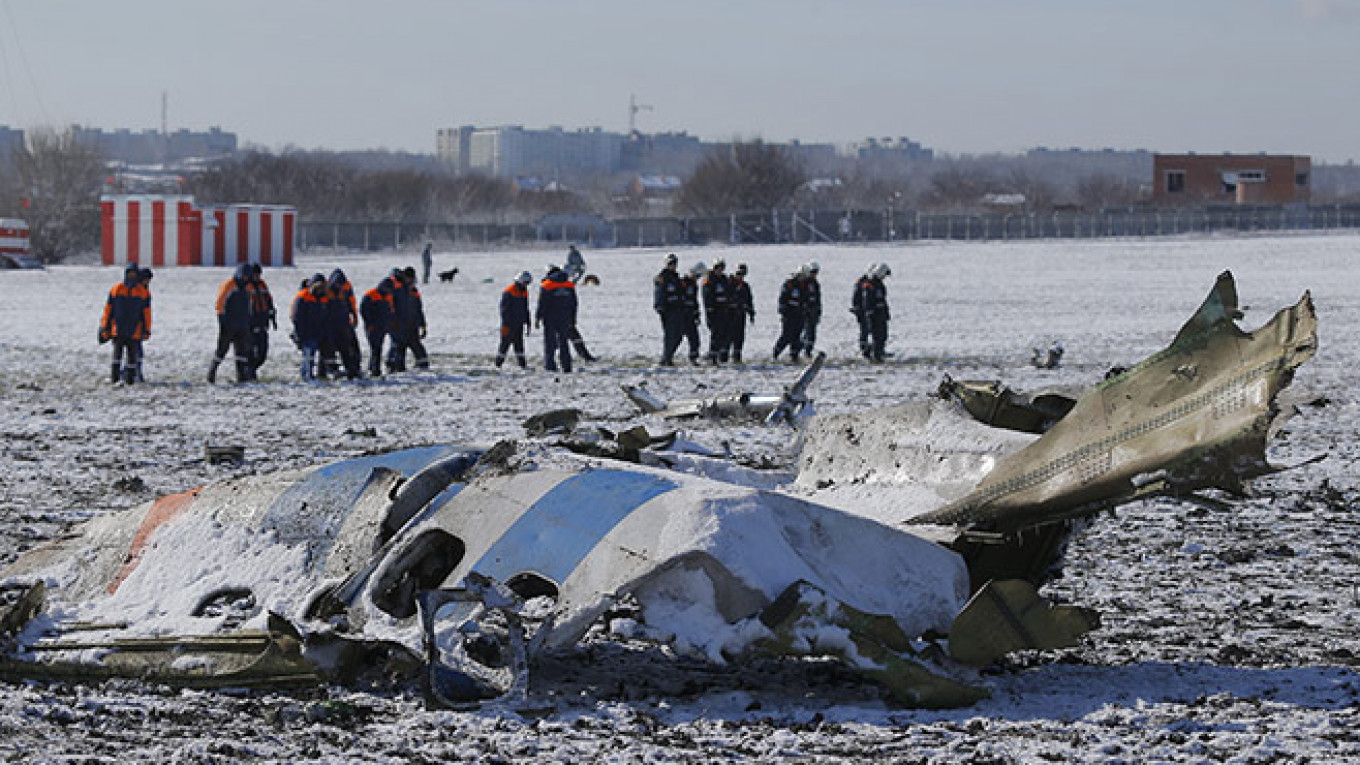Officials have yet to identify the cause of FlyDubai Flight FZ981's crash at Rostov-on-Don airport in Southern Russia on Saturday, but preliminary reports indicate either pilot error or a technical failure were the likely culprits. Meanwhile, independent aviation experts cast doubt on the developing official narrative, and instead pointed to dangerous wind conditions as the likely cause.
“I see a clear tendency to blame everything on the crew,” said Vadim Lukashevich, a Russian aerospace engineer who has worked for Sukhoi, one of Russia's primary aircraft design firms. “In my understanding, an error on the part of airport management must also be considered. If they closed the airport, people would have been saved,” he said.
Lukashevich was referring to reportedly dangerous weather conditions around the Rostov-on-Don airport on Saturday.
While conditions did not technically surpass the threshold to be considered unsafe, the FlyDubai aircraft was not the only plane to experience difficulties landing that day. As such, air traffic should have been closed, Lukashevich said.
The plane, operated by a low-cost subsidiary of Emirates airlines, first attempted to land two hours before it crashed, killing all 62 people aboard. The pilot apparently attempted to abort his second landing attempt at an altitude of 900 meters, but the aircraft suddenly dropped and exploded.
The Fobos weather monitoring center later reported harsh conditions at the time of the incident. According to the center's meteorologists, a rare atmospheric phenomenon was recorded at that time: a jet-stream — strong gusts of wind tearing at up to 100 kilometers per hour. Normally, this phenomenon is encountered at an altitude of 5 kilometers, but reports say it was much lower over Rostov-on-Don Saturday.
Air traffic controllers warned pilots in the area about the conditions, but left the ultimate decision to land up to the flight crews. Prior to the FlyDubai crash, an Aeroflot plane made three landing attempts at the Rostov-on-Don airport, before chosing to diver to nearby Krasnodar. Meanwhile, two planes operated by airline S7, and a Urals Airlines flight successfully landed at the Rostov airport.
A transcript of the conversation between Rostov air traffic controllers and the FlyDubai crew showed no mention of wind sheers while relaying weather reports to the plane's pilot. Lukashevich explained that a wind sheer can have dramatic effects on an aircraft flying at low altitudes.
“If the plane was hit by a wind gust, the vehicle was just thrown around by the wind. Its nose was thrown up, and the tail dropped,” he said. In this case, there could be no pilot error — mother nature intervened — Lukashevich argued. FlyDubai CEO Ghaith Al-Ghaith was quoted by the TASS news agency as saying the plane's captain was an experienced pilot, with 5,700 hours of flight time under his belt. His co-pilot was equally as experienced, with 5,669 hours of flight time.
Another independent aviation expert, Alexei Zakharov, said that he doubted weather painted the whole picture, instead arguing a variety of factors played into the FlyDubai airplane's demise, but he agreed with Lukashevich that a technical failure alone was to blame.
For starters, the aircraft was a relatively new Boeing 737 aircraft — one of the most common civilian aircraft in the world — and it had passed maintenance checks on Jan. 21. FlyDubai has one of the youngest fleets of aircraft on the market, with an average vehicle age of 3.1 years.
Zakharov said that FlyDubai is known to take technical maintenance very seriously, and treats its flight crews well. The crash in Rostov-on-Don has been the only fatal accident in the company's history since its founding in 2008. Lukashevich cast similar doubt on the technical error version of events: the pilot didn't report any technical problems during his first landing attempt, he said.
Prime Minister Dmitry Medvedev, speaking about the crash on Monday, said simply: “It’s too early for any conclusions, even preliminary ones, although all the versions have been revealed and typified.”
Contact the author at [email protected]
A Message from The Moscow Times:
Dear readers,
We are facing unprecedented challenges. Russia's Prosecutor General's Office has designated The Moscow Times as an "undesirable" organization, criminalizing our work and putting our staff at risk of prosecution. This follows our earlier unjust labeling as a "foreign agent."
These actions are direct attempts to silence independent journalism in Russia. The authorities claim our work "discredits the decisions of the Russian leadership." We see things differently: we strive to provide accurate, unbiased reporting on Russia.
We, the journalists of The Moscow Times, refuse to be silenced. But to continue our work, we need your help.
Your support, no matter how small, makes a world of difference. If you can, please support us monthly starting from just $2. It's quick to set up, and every contribution makes a significant impact.
By supporting The Moscow Times, you're defending open, independent journalism in the face of repression. Thank you for standing with us.
Remind me later.






